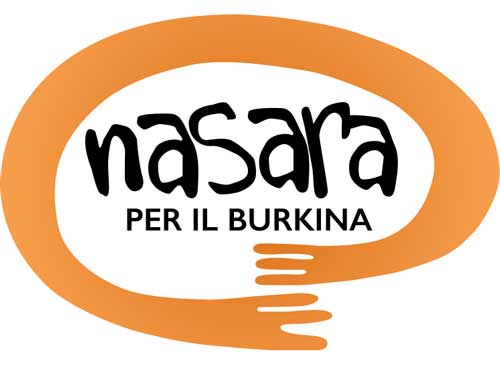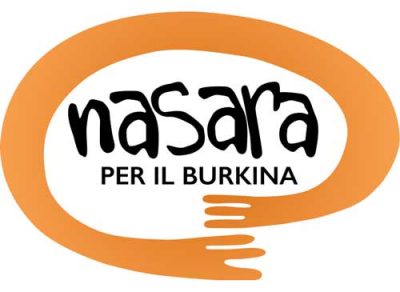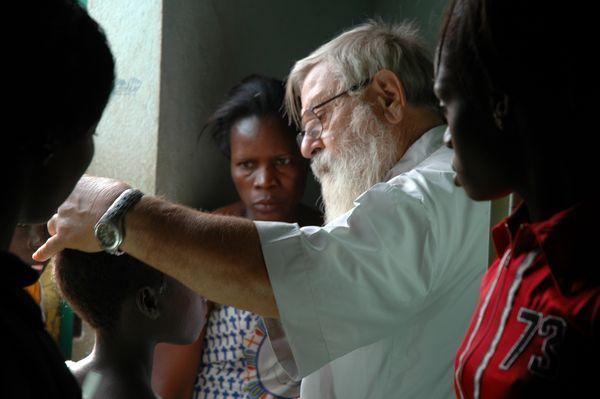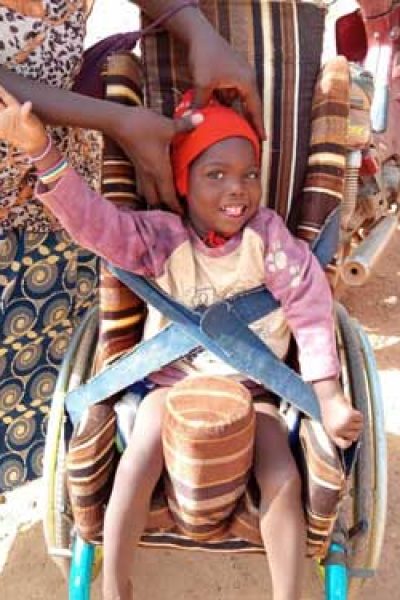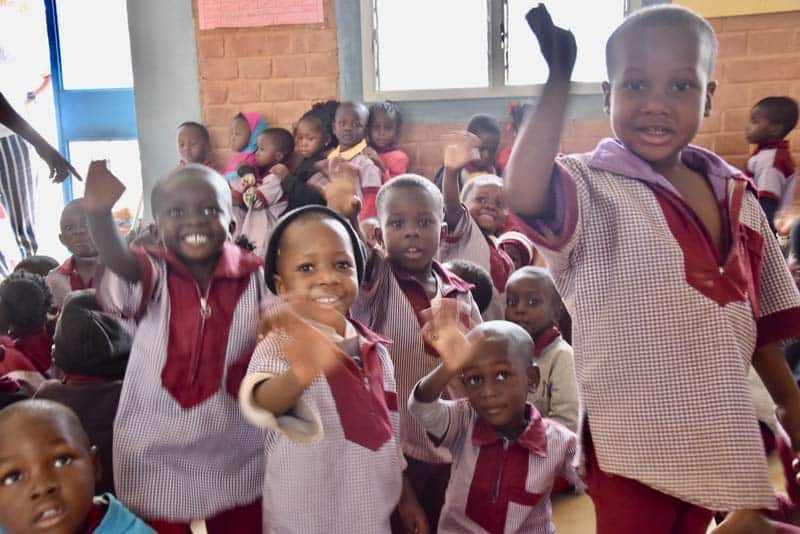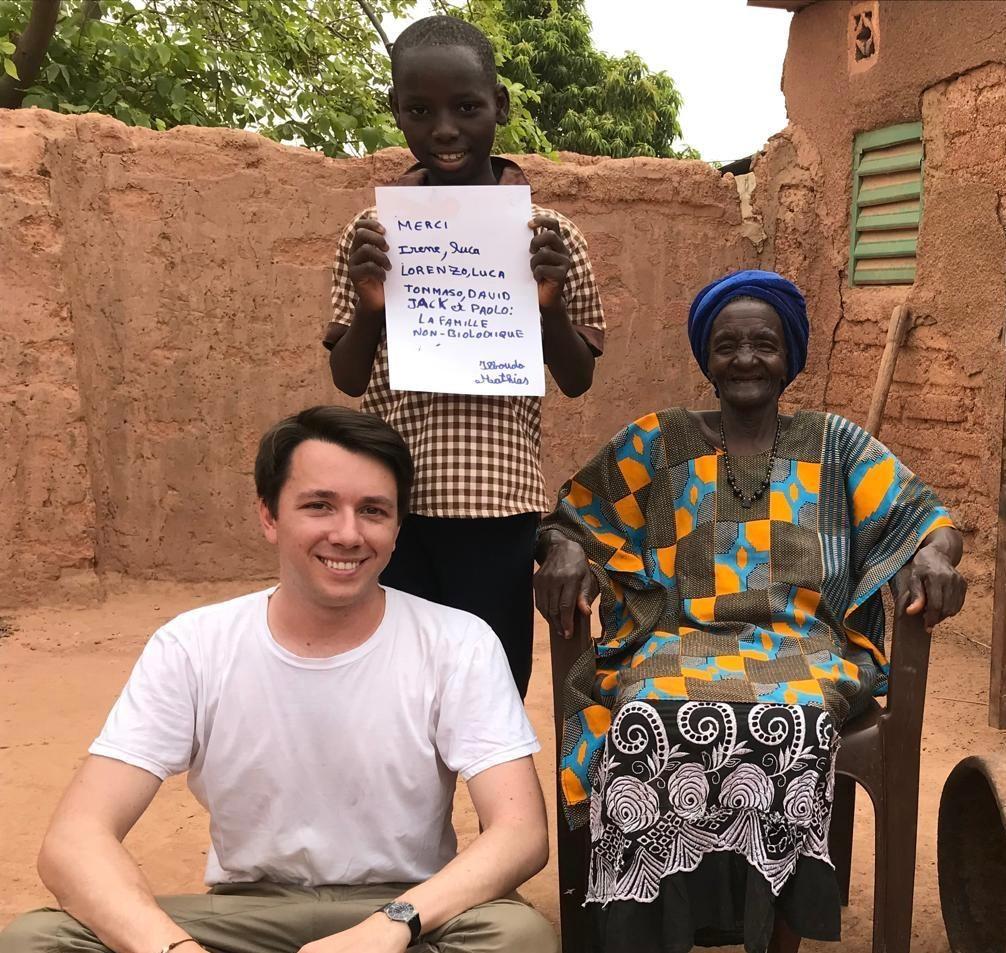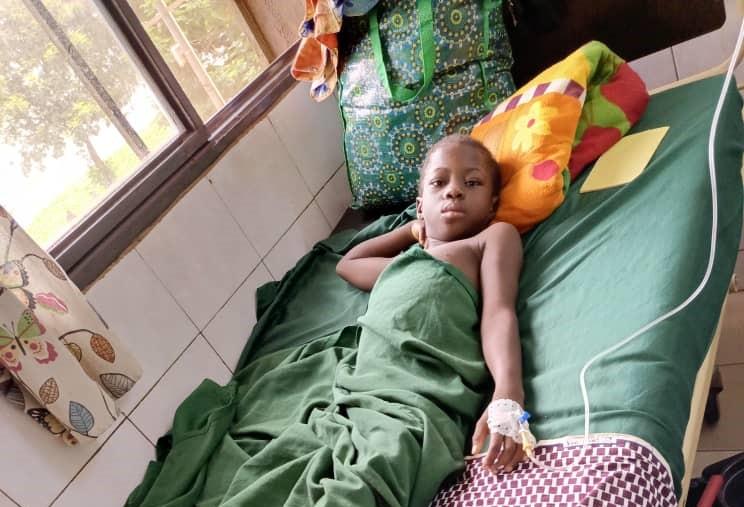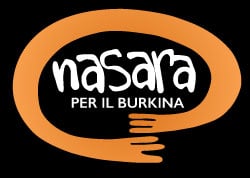Whoever knows the leprosarium in Ouagadougou cannot separate it from the unforgettable image of the person who wanted it and who has been running it for more than 40 years: Brother Vincent.
For years Nasara for Burkina has helped Brother Vincent in his activities at the leprosarium, the old women’s home, the hospital for AIDS patients (CANDAF).
Depending on the needs, we organise work camps to improve the living conditions of the lepers or the old women. For example, in 2009 we put light in the lepers’ huts, whereas in previous years we had painted the inside of them.
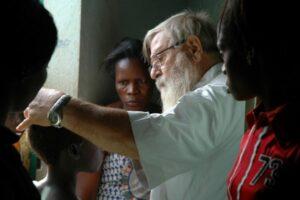
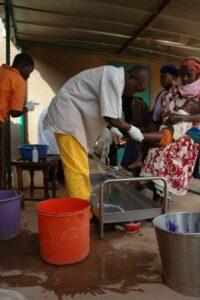
Our association, like many others, supports Brother Vincent’s activities financially as well as providing material and medicine. But what is perhaps more important is that every year some of us are present at CANDAF and stay there for the duration of their mission. Personally I would not give up this stay at CANDAF for any convenience of a hotel or B&B, because the “mere knowledge” of those who live there, and in particular Brother Vincent, and sharing their community life together is worth the trip.
The following is taken from a special report on Brother Vincent on the Camillian website. I quote it on our site because it is written by someone who has known him for many years and therefore describes him perfectly.
Brother Vincenzo could be called ‘a tramp among tramps’, but also one who becomes a leper among lepers’, so much so that he identifies with their wounds. Burly, but capable of a caress. Powerful, but one who breaks his heart into a thousand pieces for a crowd of ‘witches’ and mental wretches. Who always respond with a broad smile.
Short, stocky, with long, unkempt white hair and an equally long, unkempt beard: Brother Vincenzo Luise looks like something out of an adventure film. And indeed his life has been an adventure, in the service of God and his poorer brothers.
Born in Naples, or rather in Spaccanapoli, as a boy he was his mother’s despair. Always running around with a ‘gang’ of other kids, overbearing, wild ‘I was a real camorrista’, he says of himself as a boy.
Then the encounter with the Lord, as on the road to Damascus, sudden. A real reversal of all perspectives. He decides to become a Camillian. No one believes that he will last in his purpose. “Instead here I am, one hundred per cent Camillian; on mission, as I had wished”.
He does not know it, but he has remained a Camillian, only today he is a ‘camorrist of God’. Savage, prevaricator, open-hearted, open-handed, slovenly in his attire, his robe always askew, even if it is ‘tied’ at the waist by a high belt of rough leather.
The ‘warehouse of miracles’
Incredibly untidy: in his studio-warehouse-shelter, where all the world’s desperate people come in search of food, care, attention, are piled up in bulk sacks of rice and millet, boxes of disposable syringes, medicines, sugar, candy, paper, the most incredible tools, light bulbs, ballpoint pens, school books, musical instruments… From the dark corners, anything can come out! The table is so cluttered, that if he has to write something, he first has to make room with a handful, throwing everything on the floor. In short, a disaster.
His faith is as tumultuous as his life. He says: “Who knows if the Lord will welcome me into heaven when I die?”.
Would he have any doubts? “Yes, I am too lucky! I can do too many good things, here, among these poor people… of everything I will have to answer… and what will I answer? What will the Lord Jesus ask me?” It is useless to answer him that the Lord is not an accountant, and that in any case his accounts are quite different from ours. He, Brother Vincenzo Luise, Camillian d.o.c., will continue to think as he likes.
Brother Vincenzo’s day starts early in the morning, with the liturgy of the hours and Holy Mass, in community. Then, after standing up with a cup of coffee, he dashes out, jumps (literally, despite his age and size) onto his off-roader, laden with popcorn and syringes, bags of rice and antibiotics, all thrown around, the windows always covered in red dust, the floor always covered with small stones and various merchandise picked up here and there… in short, a car absolutely in line with the driver. And driving recklessly through the clogged streets of Ouaga, he begins his daily rounds.
The world of the poor
First he goes to check the progress of the work on the building of a home for abandoned AIDS patients. He gives instructions to the surveyor and the site manager, greets an old gentleman standing there as if he were the guard, checks that no materials have been stolen, and leaves, uttering ejaculations in the same tone as if they were expletives.
Again on the off road and down towards a group of houses on the outskirts. “There are still lepers here, and not a few.” And the gaze says what the lips do not utter: “What a shame, near Ouaga 2000!”. He enters the houses, the children run up to him and cling to his robe. Adults, more respectfully, greet him with sad smiles. Brother Vincenzo has a joke for everyone: who knows what these people will understand about his Franco-Parthaginianism!
He treats sores that reach the bones, ancient wounds that will never heal.
It consoles worried mothers. He invites others, too young to be aware of the dangers, to worry about the fever, too high, of a little boy. “I’ll be back in the afternoon with the medicine. But you remember to give it regularly!”.
Still on the off-road; we cross the city centre again to another suburb. More poor families. More children wanting to jump on the off-road. More lepers to medicate. There is one of them, a hundred years old, who can no longer hear or see. He is now a stub of a man who still does not want to die: the mystery of life. No one would clean and feed him if it were not for Brother Vincenzo’s young volunteers. In the next room (what’s the difference with the small stables where goats and chickens are kept?), a nonagenarian, also now without contact with the outside world. Brother Vincenzo has a caress for her too: perhaps the only feeling of sweetness she still has left.
Another turn, another gift: now Brother Vincent runs along the barrage that protects the water that quenches the city’s thirst. With his hand he points to a series of small fields, right along the barrage, he points to them proudly. “You see? These are the lepers’ fields. Everyone has a piece of them and grows ornamental plants, vegetables, fruit there, which he then sells. That’s how he makes a living with his family…’.
